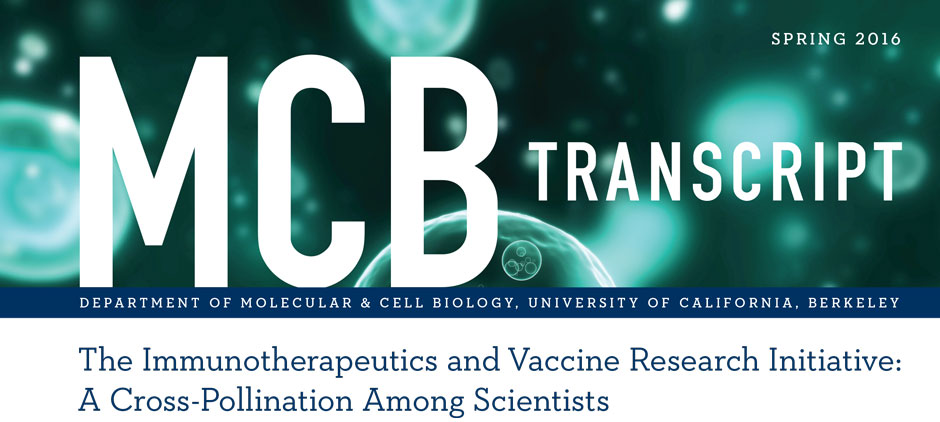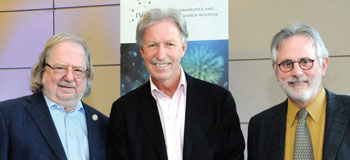
Those who have experienced cancer firsthand know that the treatment — debilitating chemical therapies — can often be as deadly as the illness itself. Now Berkeley scientists are collaborating across campus to research the next generation of therapies, harnessing the human immune system to fight not only cancer but any infectious diseases that threaten populations worldwide.
On March 24, the Immunotherapeutics and Vaccine Research Initiative (IVRI) was unveiled — a joint effort of the Cancer Research Lab (CRL) and the Center for Emerging and Neglected Diseases (CEND). The launch was partnered with a Symposium on Immunotherapy, which included prominent speakers in cancer immunotherapy and vaccines.

James Allison, Stephan T. Isaacs, and David Raulet.
Aduro Biotech, Inc. Chairman, President, and CEO Stephen T. Isaacs announced a foundational investment of $7.5 million from the Berkeley biotech company, which is focused on immunotherapies for cancer and other diseases. According to IVRI Executive Director Michael Eichberg, the funding will support projects in multiple labs across campus in pursuit of cutting-edge research including the identification of novel targets and approaches for immunotherapies, as well as the design and early-stage testing of novel vaccines for cancer and infections.
The work of Berkeley scientists to understand the immune response against parasites and infections is now revealing new ways to treat cancer by awakening the immune system, says IVRI Director David Raulet, a professor and co-chair of the Department of Molecular & Cell Biology, and holder of the Esther and Wendy Schekman Chair in Basic Cancer Biology. Conversely, it’s believed that studies of cancer immunology can yield innovations for vaccines and therapies targeting infectious diseases. “These are areas that have a lot to say to each other,” Raulet says. “The genesis of IVRI was the realization that we’re at the head of the pack for this approach. There have been at least two or three major findings from Berkeley faculty that have led directly to cancer immunotherapies.”
New techniques include exploring a new class of immune-system stimulants called cyclic di-nucleotides — which have been shown to shrink tumors and strengthen vaccines against tuberculosis. In addition to TB, this research shows promise in combatting such diseases as the Dengue virus; listeriosis (a form of food poisoning); legionella; and various forms of the herpes virus. Stimulants associated with disease-causing microbes can help bolster the immune system’s natural killer cells to more effectively fight tumors.
The idea of combining these two areas — the immunology of cancer and that of infectious disease — is generating strong interest based on highly successful outcomes in the work of James Allison while he was a professor of immunology and director of the Cancer Research Laboratory at UC Berkeley from 1985 to 2004. Now a professor and chair of Immunology, and director of the Parker Institute for Cancer Immunotherapy at the University of Texas MD Anderson Cancer Center, Allison found a way to unleash the body’s T-cell responses to cancer — an approach that has now become standard for treating melanoma and other cancers and has already saved thousands of lives. “The field of tumor immunology was long considered junk science or snake oil, but several times in my career I’ve thought, I think I know a way we can get the immune system to attack cancer,” he says.
“Locating IVRI at Berkeley makes a lot of sense, as very few institutions have comparably profound strengths in both immunology and infectious disease to perform the fundamental, mechanistic research that fuels these discoveries,” says CEND Faculty Director Jeffery Cox. “It will play a vital role in promoting research with an eye toward applications to human health.”
Raulet agrees. “This initiative deepens the already rich scientific environment at Berkeley, enabling scientists to collaborate who don’t normally work together,” he says. “By uniting our efforts, we may well eliminate these diseases in our lifetime.”
To learn how you can support the work of IVRI and the Department of Molecular & Cell Biology, contact the MCB Co-Chairs at mcbchair@berkeley.edu.




